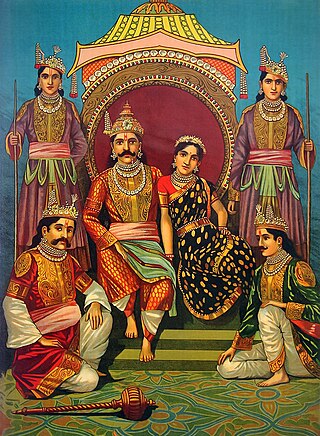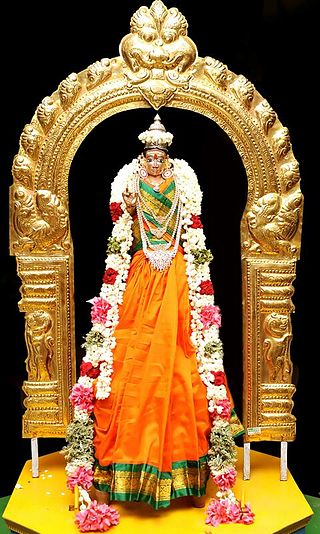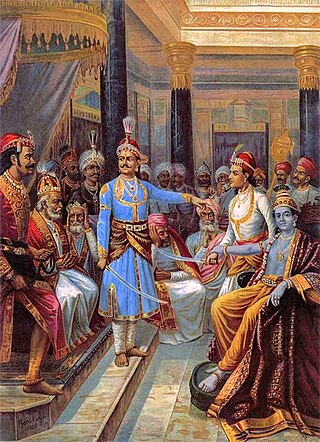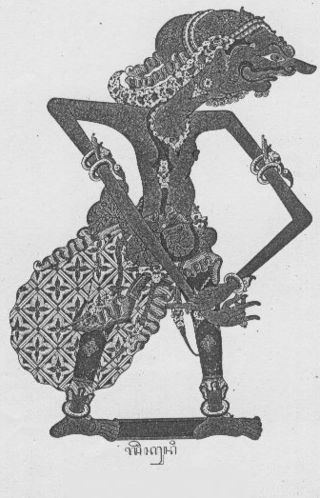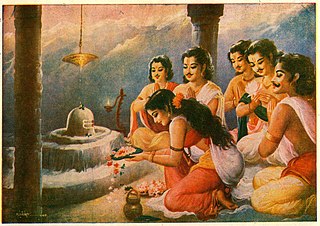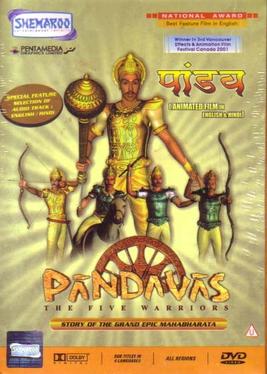| Yaksha’s Prashna (questions) | Yudhisthra Uttara (answers) |
|---|
| Sun God | |
| Who makes the sun rise? | Brahma (the Supreme) |
| Who keeps the sun company? | Gods |
| Who causes the sun to set? | Dharma |
| And in whom is the sun established? | Truth |
| Learning, intelligence | |
| By what does one become learned? | By Srutis (that scriptures which are heard) |
| How one acquires something very great? | By ascetics austerities (tapas) |
| How can one acquire intelligence? | By serving the old |
| Brahmins (learned/saints) | |
| What constituents the divinity of Brahmanas? | Study of Vedas (scriptures) |
| What is pious practice in them? | Their asceticism (penance) constituents' behavior that is like that of the pious. |
| What is human attributes of Brahmanas? | Death |
| What is impious practice in them? | Insulting anyone is their impiety. |
| Kshatriyas (kings/warriors) | |
| What constituents the divinity of Kshatriyas? | Arrows and their weapons |
| What is pious practice in them? | Celebration of sacrifices |
| What is human attributes of Kshatriyas? | Fear |
| What is impious practice in them? | Refusal of protection Dharma |
| Cultivate, sow, prosperity | |
| What is value to those who cultivate? | Rain |
| What is value to those who sow? | Seed |
| What is value to those who wish the prosperity in this world? | Preacher |
| What is value to those who that bring forth? | Offspring |
| Living dead | |
| What person who enjoying all the objects of sensing, breathing but yet is not alive? | The person who do not offer anything to gods, guests, servant, pitris etc. |
| Heavier, higher, fleeter, numerous | |
| What is heavier than earth? | Mother |
| What is higher than heaven? | Father |
| What is fleeter (running fast) than wind? | Mind |
| What is more numerous than grass? | Thoughts |
| Generic – miscallenous | |
| What which sleep does not close eyes? | Fish |
| What which does not move after birth? | Egg |
| What which is without heart? | Stone |
| What which swells in its own impetus? | River |
| Friend | |
| Who is friend of the exile? | Companion |
| Who is friend of the householder? | Wife |
| Who is friend of the sick? | Physician |
| Who is friend of one who is about to die? | Charity |
| Duty, guest, amrita, universe | |
| Who is guest of all creatures? | Agni (fire) |
| What is eternal duty? | Homa (Yajna sacrifice), following regulations of Sanatan Dharam |
| What is Amrita? | Milk of cow is Amrita |
| What is in the universe? | Universe consists of air alone. |
| Mortal/immortal/rebirth | |
| What is that which stays alone? | The sun |
| What is reborn after its birth? | The moon |
| What is remedy against cold? | Fire |
| What is the largest field? | Earth |
| Virtue/fame/heaver/happiness | |
| What is highest shelter of virtue? | Liberty is the highest guard of virtue |
| What is highest shelter of fame? | Gift is the highest guard of fame |
| What is highest shelter of heaven? | Truth is highest guard of heaven |
| What is highest shelter of happiness? | Good behavior is the highest guard of happiness |
| Man's (soul, friend, support) | |
| What is soul of man? | Son |
| Who is that friend bestowed on man by the gods? | Wife |
| What is man’s chief support? | Clouds |
| What is man’s chief refuge? | Charity |
| Possessions/gains/happiness | |
| What is best of all laudable things? | Skills |
| What is most valuable possession? | Knowledge |
| What is best of all gains? | Health |
| What is best of all kind of happiness? | Contentment |
| Duty, regret, alliance | |
| What is the highest duty in the world? | Refrain from injury is the highest duty |
| What is that virtue which always bears fruits? | Rites ordained in Vedas always bear fruits |
| What is that if controlled, leads to no regret? | Mind if controlled, leads no regrets |
| With whom alliance cannot break? | Alliance with good never breaks |
| What if renounced | |
| What if renounced, make one agreeable? | Pride |
| What if renounced, leads no regret? | Anger |
| What if renounced, makes one wealthy? | Desire |
| What if renounced, makes one happy? | Greed |
| Why giving | |
| Why one give to Brahmanas? | For religious merit |
| Why one give to actors/dancers? | For fame |
| Why one give to servants? | For supporting them |
| Why one give to king? | For obtaining relief from fear |
| Discovering | |
| With what is world enveloped? | Darkness |
| What is that owing to which a thing cannot discover itself? | Darkness not permit a thing to show itself |
| Why one fail to go to heaven? | Connection with world make one fail to go to heaven |
| Why friends are forsaken? | Greed and lust |
| Dead | |
| Which one is considered as dead? | One having want of wealth |
| Which sacrifice is considered as dead? | One having no gifts for Brahmanas |
| Which Shardha (Puja) is considered as dead? | Shardha performed by aid of Guru, who having no real knowledge |
| Which kingdom is considered as dead? | Kingdom of want of a king |
| Restrain, forgiveness, shame | |
| What is sign of asceticism? | Staying in one’s own religion |
| What is true restraint? | Restrain of mind |
| What is forgiveness? | Stable enmity |
| What is shame? | Withdrawing from all unworthy acts |
| Knowledge, peace, mercy, simplicity | |
| What is true knowledge? | True knowledge of the Lord (Krishna) |
| What is tranquility (peace)? | True tranquility of heart |
| What is mercy? | Wishing happiness for all living creatures |
| What is simplicity? | Calmness of heart |
| Enemy, disease, honest/dishonest | |
| Which enemy is invincible? | Anger |
| What is incurable disease? | Greediness |
| Who is honest? | Wishes well for all creatures |
| Who is dishonest? | Un-merciful |
| Ignorance, pride, idleness, grief | |
| What is ignorance? | Not knowing one’s duty |
| What is pride? | Consciousness of one’s being himself sufferer in life (ignorance) |
| What is idleness? | Not discharging one’s prescribed duties |
| What is grief? | Ignorance |
| Patience, real bath, charity | |
| What is steadiness? | Staying in one’s own religion |
| What is patience? | Overpowering of senses |
| What is real ablution (bath)? | Washing the mind, clean of all impurities |
| What is charity? | Protecting all creatures |
| Learned, atheist, desire, envy | |
| Who is learned? | Who knows his duties |
| Who is atheist? | Who is ignorant |
| What is desire? | Desire is due to object of possession |
| What is envy? | Grief of heart |
| Hypocrisy, wickedness | |
| What is hypocrisy? | Setting up of religious standards |
| What is wickedness? | Speaking bad of others |
| What is grace of gods? | Fruits of our gifts (charity) |
| What one gains, on….. | |
| What one gains on speaking agreeable words? | One becomes agreeable to all |
| What one gains on acting with judgment? | One obtains whatever one seeks |
| What one gains having many friends? | One lives happily |
| What one gain if devoted to virtue? | One obtains a happy state in next world |
| True happiness, most wonderful | |
| Who is truly happy? | One who can cook in own home One who refrain from tamas food One who has no debt One who does not come out of home for his livelihood One who does not over striving for material things |
| What is most wonderful? | Every day numerous living entities are dying and going to the abode of Yama. Yet one think/believe one will live remain forever (immortal). What can be more wonderful than this? |
| What is the path? | The best path is to follow in the footsteps of the pure devotees (mahajanas) whose hearts are full of real truth regarding Dharma. |
| What is the news? (What is the real situation in the material world)? | This world full of ignorance is like a pan. The sun is fire, the days and nights are fuel. The months and the seasons constitute the wooden ladle. Time is the cook that is cooking all creatures in that pan (with such aids); This is the real news of what is happening in the material world, which is a miserable place full of ignorance |
| Dharma, Artha, Kama | |
| Virtue (Dharma), Artha (profit) and Kama (desire) are opposed to each other, how they can co-exist harmoniously? | They can co-exists only if, one having a virtuous Wife. |
| Condemned to everlasting hell | |
| Who is condemned on what acts, to everlasting hell? | If one promise a poor Brahmin, a charity; but upon his arrival refuse to give him. Who speak falsehood of Vedas, scriptures, Who despite possessing, does not give because of greediness. |
| About real Brahmin | |
| What constituents the real Brahmana? Birth, study, family, learning or behaviour? | Behaviour Note: A Shudra is better; if his behavior is better than a so-called learned Brahmana (having wicked behavior, not matter how much he has learned) |
| True man | |
| Who is true man, possessing all kinds of wealth? | One who has overcome the dualities of material life, i.e. happiness/sadness, friend/enemy, love/hate, heat/cold, etc. possesses all kinds of wealth. |
| Generic ~ miscellaneous | |
| What is poison? | Requesting someone |
| What is proper time for Puja (Shraddha)? | There is no proper time for Shraddha (puja), when one want one can, (if possible find a Guru). One can do puja to Lord Hari any time; one can take his name any time. |
| What is food? | Cow is the root of all foods, Cow gives milk, which produce butter ghee, which is used in Yajna, sacrifices. The sacrifices are causes of clouds, which bring rain. Rain is essential for producing food from seeds, (corps). |

